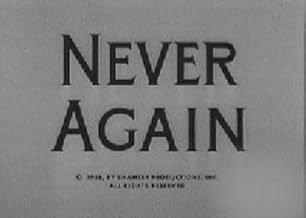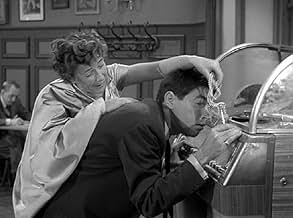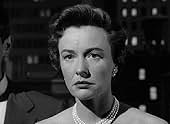After arguing with her boyfriend, Karen wakes up in a jail cell with no recollection of what transpired and is told some horrifying news.After arguing with her boyfriend, Karen wakes up in a jail cell with no recollection of what transpired and is told some horrifying news.After arguing with her boyfriend, Karen wakes up in a jail cell with no recollection of what transpired and is told some horrifying news.
Louise Allbritton
- Renee Marlow
- (as Louise Albritton)
Don Ames
- Party Guest
- (uncredited)
Jack Deery
- Bar Patron
- (uncredited)
Franklyn Farnum
- Party Guest
- (uncredited)
Kenneth Gibson
- Party Guest
- (uncredited)
Herschel Graham
- Party Guest
- (uncredited)
George Washburn
- Bar Patron
- (uncredited)
Featured reviews
I've been a fan of Phyllis Thaxter (lead actress in this episode) for a very long time but I believe she was truly underrated. Anyone who has seen this actress in the 1940s movie Bewitched will know what an incredible performance she gave as the tortured woman with multiple personalities. I have to assume that Alfred Hitchcock was fond of her work as she starred in six episodes of Alfred Hitchcock Presents and three of The Alfred Hitchcock Hour.
This episode is very powerful and intriguing. Karen is a very insecure woman and has a problem with alcohol. When Never Again starts it does appear that Karen is in control but it very soon becomes apparent that she's spiraling out of control.
The story is told mostly in backflashes by Karen. The climax is beyond tragic.
Sir Alfred's monologue is a strong indication of the seriousiness of this episode and alcoholism.
This episode is very powerful and intriguing. Karen is a very insecure woman and has a problem with alcohol. When Never Again starts it does appear that Karen is in control but it very soon becomes apparent that she's spiraling out of control.
The story is told mostly in backflashes by Karen. The climax is beyond tragic.
Sir Alfred's monologue is a strong indication of the seriousiness of this episode and alcoholism.
An excellent sketch from the first season. Seems to be essaying the cocktail culture of the organizational man. We see the pressures wrought by the Madison Avenue set of the high 50s and how only a few were allowed to feel comfortable there.
Phyllis Thaxter, as the protagonist Karen Stewart, got her start in some Peyton Place type movies of the 1940s and then quickly moved into early television theater, performing multiple stints on venerable TV drama showcases as both the Ford and Motorola playhouses.
She does a spectacular job here as a woman past her youth who does not belong to the "smart talk" of the account exec peers of her fiancé, Jeff, played by a natty Warren Stevens. Her fight to stay whole is beclouded by a desperate descent into drink.
She staves it off through most of the sketch, but the inevitable incursion of an aggressive Madison paramoor, competing for the attentions of Jeff, pushes her over the edge and she goes into a violent drinking rampage.
I'm rooting for Karen until the end, seeing her basic intentions and sincerity as the match for any of those fast-talking ad ladies. And yet she has no sense of how to use that gift to compete. She simply panics and eventually turns to the martini for protection.
Hitchcock often created highly neatened vignettes about murder and personal sabotage, but in this one, he lets all the messiness hang out, the rage and the raw feelings of self doubt, to great effect. It is one of the most shocking of all Hitch's TV efforts because of the way the unprotected self is stripped down to its bare bones to survive, brilliantly demonstrated by Ms. Thaxter.
In the epilogue, the master provides an apologia for the power of the episode, saying he will not go into his usual tongue in cheek bit about the fate of a deserving antagonist. Instead, he suggests this is more of a cautionary outing in the hopes that it will prevent some struggling soul from a similar fate.
Unforgettable.
Phyllis Thaxter, as the protagonist Karen Stewart, got her start in some Peyton Place type movies of the 1940s and then quickly moved into early television theater, performing multiple stints on venerable TV drama showcases as both the Ford and Motorola playhouses.
She does a spectacular job here as a woman past her youth who does not belong to the "smart talk" of the account exec peers of her fiancé, Jeff, played by a natty Warren Stevens. Her fight to stay whole is beclouded by a desperate descent into drink.
She staves it off through most of the sketch, but the inevitable incursion of an aggressive Madison paramoor, competing for the attentions of Jeff, pushes her over the edge and she goes into a violent drinking rampage.
I'm rooting for Karen until the end, seeing her basic intentions and sincerity as the match for any of those fast-talking ad ladies. And yet she has no sense of how to use that gift to compete. She simply panics and eventually turns to the martini for protection.
Hitchcock often created highly neatened vignettes about murder and personal sabotage, but in this one, he lets all the messiness hang out, the rage and the raw feelings of self doubt, to great effect. It is one of the most shocking of all Hitch's TV efforts because of the way the unprotected self is stripped down to its bare bones to survive, brilliantly demonstrated by Ms. Thaxter.
In the epilogue, the master provides an apologia for the power of the episode, saying he will not go into his usual tongue in cheek bit about the fate of a deserving antagonist. Instead, he suggests this is more of a cautionary outing in the hopes that it will prevent some struggling soul from a similar fate.
Unforgettable.
Karen (Phyllis Thaxter) awakens in the hospital...her arm bandaged and she's in bed. But she cannot recall how she's gotten there. And, through the course of her time there, she thinks back to the events that MIGHT have gotten her there.
Soon you learn in the flashbacks that Karen is an alcoholic. During much of the flashback, she's dry...but the underlying issues and problems that get her to drink aren't addressed at all...and you see it's only a matter of time before she drinks again. And, when she does start drinking, she's totally out of control. But how exactly did she end up in the hospital??
This is one of the most unusual episodes I've ever seen. It's not like others, as it lacks the usual 'Hitchcockian' twist and is a pretty straight-forward show about the dangers of alcoholism. And, as such, Hitchcock himself is very restrained and says as much. Well handled.
Soon you learn in the flashbacks that Karen is an alcoholic. During much of the flashback, she's dry...but the underlying issues and problems that get her to drink aren't addressed at all...and you see it's only a matter of time before she drinks again. And, when she does start drinking, she's totally out of control. But how exactly did she end up in the hospital??
This is one of the most unusual episodes I've ever seen. It's not like others, as it lacks the usual 'Hitchcockian' twist and is a pretty straight-forward show about the dangers of alcoholism. And, as such, Hitchcock himself is very restrained and says as much. Well handled.
What immediately got me sold about "Never Again" was the subject matter. A unique and more serious subject for 'Alfred Hitchcock Presents', that was very different for the series up to this point of its run and continued to be. It is also a subject that is as hard hitting as one can get and for the time was quite ground-breaking and daring. Was a little worried on first watch that it would be flashback heavy, a story device that has always been done variably in film and television.
One that thankfully is done very well in "Never Again". An episode that is as harrowing as its subject suggests and really does stand out amongst the usually more suspenseful and ironic episodes of Season 1. While not one of my favourites of 'Alfred Hitchcock Presents', "Never Again" is very well crafted, interesting and emotionally impactful entry that handles the subject very well. Also think it one of director Robert Stevens' better episodes of Season 1.
"Never Again" is not quite perfect. Not everything resolves enough, which makes one wondering what the point of a few plot points are (the party rejection) and also the logic.
Although Hitchcock's bookending is always entertaining and unmistakably Hitchcock in humour, with such a serious subject it did feel on the slightly out of place side tonally.
However, a lot is great. The production values are solid and atmospheric, the simple location not being claustrophobic or cheap and made more interesting by the photography. "Funeral March of a Marionette" continues to be a memorable main theme for the series. Stevens' direction is beautifully done, even in scenes that could easily have been dull padding.
The harrowing and ahead of the time subject matter is handled with intensity, sincerity and tact, it did break my heart and disturb me in a way not seen a lot to this extent in most of Season 1. The flashbacks don't bog down the momentum, like flashbacks use can do, and are not overused and a good way of going into detail how the situation came about. The script is thoughtful and doesn't have too much fat.
Pretty much almost everything is done extremely well, but other than the atmosphere and emotional impact the best thing about "Never Again" is the poignant performance from Phyllis Thaxter as you have never seen her before.
In summary, very good. 8/10.
One that thankfully is done very well in "Never Again". An episode that is as harrowing as its subject suggests and really does stand out amongst the usually more suspenseful and ironic episodes of Season 1. While not one of my favourites of 'Alfred Hitchcock Presents', "Never Again" is very well crafted, interesting and emotionally impactful entry that handles the subject very well. Also think it one of director Robert Stevens' better episodes of Season 1.
"Never Again" is not quite perfect. Not everything resolves enough, which makes one wondering what the point of a few plot points are (the party rejection) and also the logic.
Although Hitchcock's bookending is always entertaining and unmistakably Hitchcock in humour, with such a serious subject it did feel on the slightly out of place side tonally.
However, a lot is great. The production values are solid and atmospheric, the simple location not being claustrophobic or cheap and made more interesting by the photography. "Funeral March of a Marionette" continues to be a memorable main theme for the series. Stevens' direction is beautifully done, even in scenes that could easily have been dull padding.
The harrowing and ahead of the time subject matter is handled with intensity, sincerity and tact, it did break my heart and disturb me in a way not seen a lot to this extent in most of Season 1. The flashbacks don't bog down the momentum, like flashbacks use can do, and are not overused and a good way of going into detail how the situation came about. The script is thoughtful and doesn't have too much fat.
Pretty much almost everything is done extremely well, but other than the atmosphere and emotional impact the best thing about "Never Again" is the poignant performance from Phyllis Thaxter as you have never seen her before.
In summary, very good. 8/10.
This is a bit different for this series. It's the story of a neurotic woman who is an alcoholic. It begins as she lies in a hospital bed, trying to put the pieces together of an evening she can't really remember. She has been injured with cuts and just can't remember. We are taken in flashback to the events of the previous days and that evening. She is consumed with jealousy and self doubt and makes life miserable for all around her. Obviously, Hitchcock is going to put a zinger at the end, but this is more "Lost Weekend" or "Days of Wine and Roses" than the usual ironic fare that was this TV show. It is pretty penetrating. At this time, most didn't know what an alcoholic was. Most thought they were those men hanging from lamp poles singing Sweet Adeline. This is really quite well done and quite tragic.
Did you know
- TriviaOne of the few times in which the serious subject matter (in this case, alcoholism) prompted host Alfred Hitchcock to deliver a straightforward closing epilogue, rather than one of his usual humorous quips.
- Quotes
[last lines]
Himself - Host: Ladies and gentlemen, may I just for this once depart from our customary epilogue. Tonight we have brought you a drama based on one of Adela Rogers St. John's most powerful stories with the hope that somewhere, somehow, it will help someone.
- ConnectionsReferences Casablanca (1942)
- SoundtracksFuneral March of a Marionette
Written by Charles Gounod
Details
- Runtime
- 30m
- Color
- Aspect ratio
- 1.33 : 1
Contribute to this page
Suggest an edit or add missing content


















